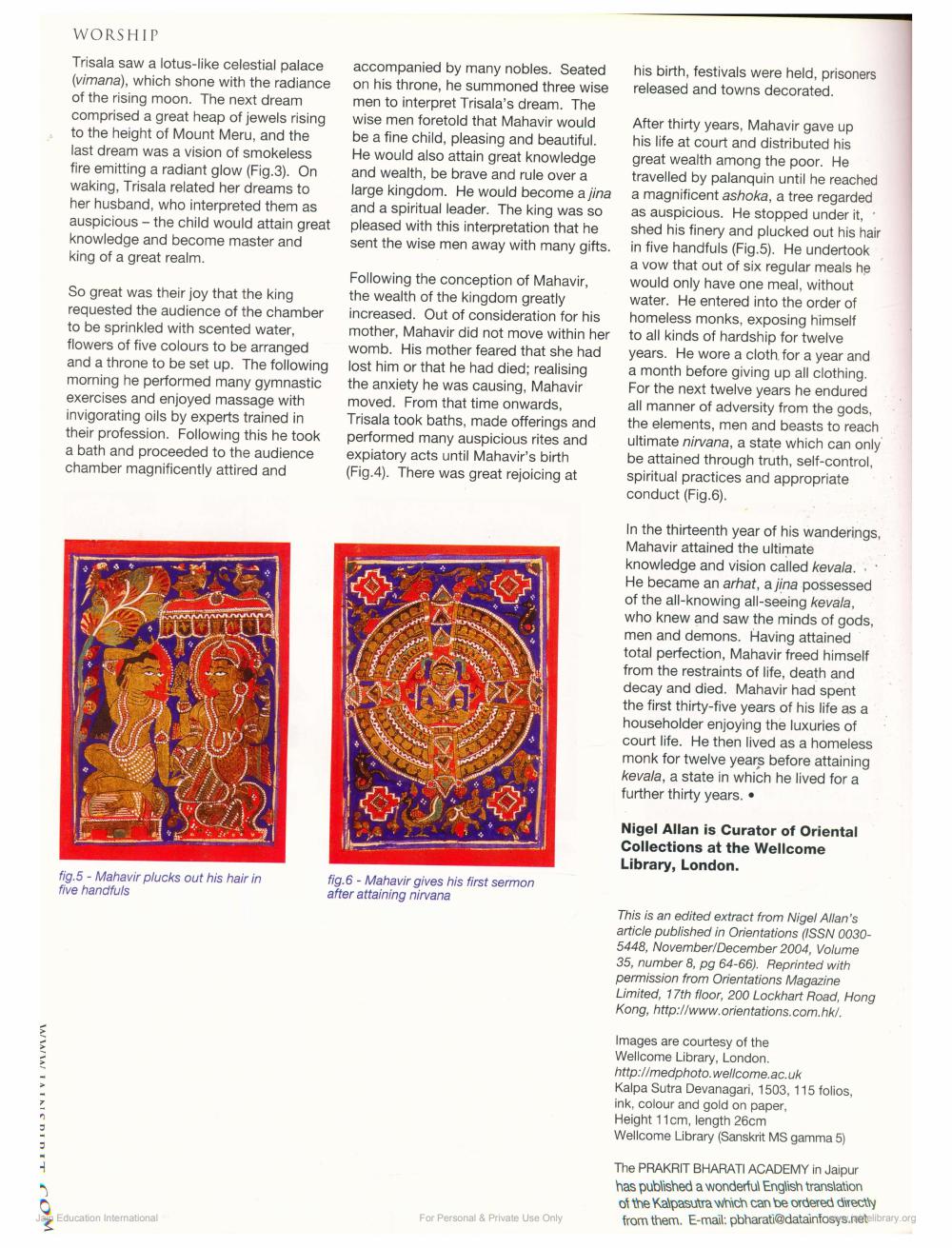________________
W/MA/MA/ EA EKIC DIDI
COM
WORSHIP
Trisala saw a lotus-like celestial palace (vimana), which shone with the radiance of the rising moon. The next dream comprised a great heap of jewels rising to the height of Mount Meru, and the last dream was a vision of smokeless fire emitting a radiant glow (Fig.3). On waking, Trisala related her dreams to her husband, who interpreted them as auspicious the child would attain great knowledge and become master and king of a great realm.
So great was their joy that the king requested the audience of the chamber to be sprinkled with scented water, flowers of five colours to be arranged and a throne to be set up. The following morning he performed many gymnastic exercises and enjoyed massage with invigorating oils by experts trained in their profession. Following this he took a bath and proceeded to the audience chamber magnificently attired and
fig.5-Mahavir plucks out his hair in five handfuls
Jan Education International
accompanied by many nobles. Seated on his throne, he summoned three wise men to interpret Trisala's dream. The wise men foretold that Mahavir would be a fine child, pleasing and beautiful. He would also attain great knowledge and wealth, be brave and rule over a large kingdom. He would become a jina and a spiritual leader. The king was so pleased with this interpretation that he sent the wise men away with many gifts.
Following the conception of Mahavir, the wealth of the kingdom greatly increased. Out of consideration for his mother, Mahavir did not move within her womb. His mother feared that she had lost him or that he had died; realising the anxiety he was causing, Mahavir moved. From that time onwards, Trisala took baths, made offerings and performed many auspicious rites and expiatory acts until Mahavir's birth (Fig.4). There was great rejoicing at
LADO
fig.6-Mahavir gives his first sermon after attaining nirvana
For Personal & Private Use Only
his birth, festivals were held, prisoners released and towns decorated.
After thirty years, Mahavir gave up his life at court and distributed his great wealth among the poor. He travelled by palanquin until he reached a magnificent ashoka, a tree regarded as auspicious. He stopped under it, shed his finery and plucked out his hair in five handfuls (Fig.5). He undertook a vow that out of six regular meals he would only have one meal, without water. He entered into the order of homeless monks, exposing himself to all kinds of hardship for twelve years. He wore a cloth for a year and a month before giving up all clothing. For the next twelve years he endured all manner of adversity from the gods, the elements, men and beasts to reach ultimate nirvana, a state which can only be attained through truth, self-control, spiritual practices and appropriate conduct (Fig.6).
In the thirteenth year of his wanderings, Mahavir attained the ultimate knowledge and vision called kevala. He became an arhat, a jina possessed of the all-knowing all-seeing kevala, who knew and saw the minds of gods, men and demons. Having attained total perfection, Mahavir freed himself from the restraints of life, death and decay and died. Mahavir had spent the first thirty-five years of his life as a householder enjoying the luxuries of court life. He then lived as a homeless monk for twelve years before attaining kevala, a state in which he lived for a further thirty years.⚫
Nigel Allan is Curator of Oriental Collections at the Wellcome Library, London.
This is an edited extract from Nigel Allan's article published in Orientations (ISSN 00305448, November/December 2004, Volume 35, number 8, pg 64-66). Reprinted with permission from Orientations Magazine Limited, 17th floor, 200 Lockhart Road, Hong Kong, http://www.orientations.com.hk/.
Images are courtesy of the Wellcome Library, London.
http://medphoto.wellcome.ac.uk
Kalpa Sutra Devanagari, 1503, 115 folios, ink, colour and gold on paper, Height 11cm, length 26cm Wellcome Library (Sanskrit MS gamma 5)
The PRAKRIT BHARATI ACADEMY in Jaipur has published a wonderful English translation of the Kalpasutra which can be ordered directly from them. E-mail:
[email protected]



